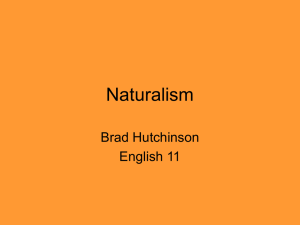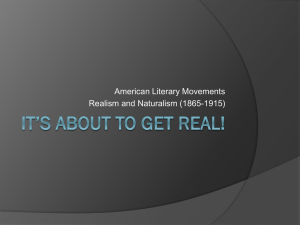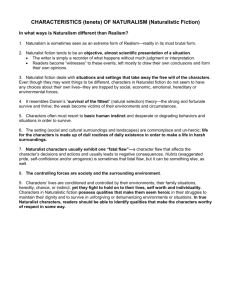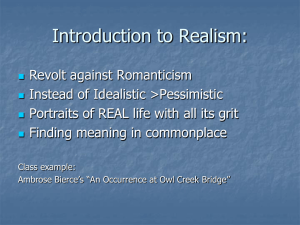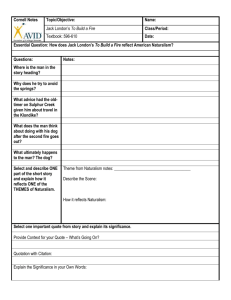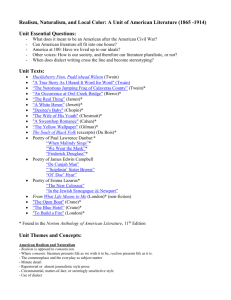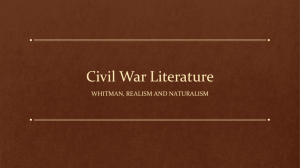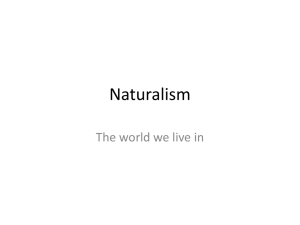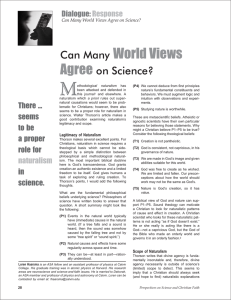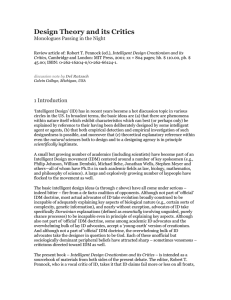Naturalism 1900
advertisement
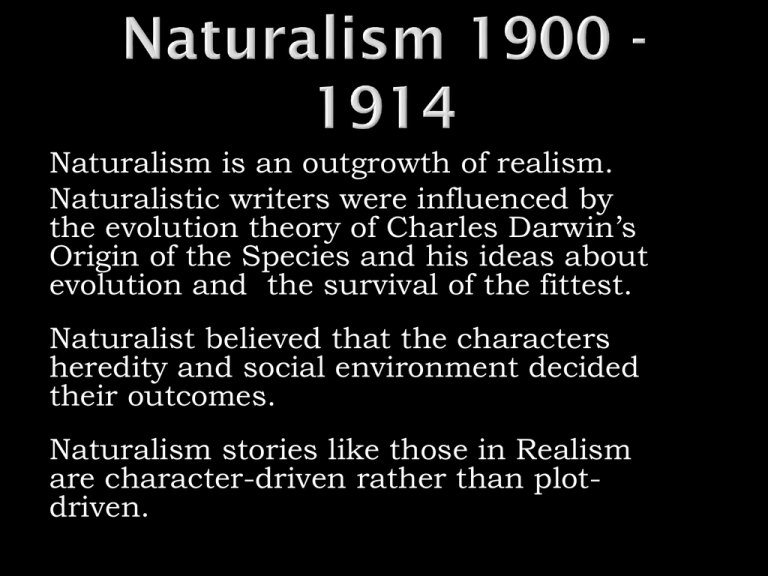
Naturalism is an outgrowth of realism. Naturalistic writers were influenced by the evolution theory of Charles Darwin’s Origin of the Species and his ideas about evolution and the survival of the fittest. Naturalist believed that the characters heredity and social environment decided their outcomes. Naturalism stories like those in Realism are character-driven rather than plotdriven. Naturalist writers view life as a battle with nature, as seen through everyday experiences of typical people. Naturalism writers pointed out the faults of the growing modern society by looking at humanity as though seen through a scientific view of an uncaring world. Example: Frank Norris’s novel The Octopus, shows how the power of railroads controlled and destroyed the lives of individuals ranchers depending on the transportation of their livestock to the eastern markets. Naturalism: literary movement characterized by a belief that people have little control over their own lives. Naturalist writers focus on the powerful economic, social, and environmental forces that shape the lives of individuals. Realism as a view of things as they really are. Naturalism gest a step further and rejects any idea of fate or destiny. Naturalism is a more extreme version of realism and teaches that man is no different than any other thing or animal. Themes and Style Naturalistic works exposed the dark harshness of life, including poverty, racism, sexism, prejudices, diseases, prostitution, and filth, both human and literal. Naturalistic authors were often criticized for being too blunt. Seeing the too negatively. Naturalistic writers used a version of the scientific method, they studied human beings ran by their instincts and passions as well as the ways in which the characters' lives were ruled by forces of heredity and environment Naturalistic writers extended a frankness about sexual functions much further than the early Realists had dared; and it is this, combined with a pervasive pessimism about humanity, which chiefly characterizes the Naturalist novel. When it occurs to a man that nature does not regard him as important, and that she feels she would not maim the universe by disposing of him, he at first wishes to throw bricks at the temple, and he hates deeply the fact that there are no bricks and no temples. --Stephen Crane, "The Open Boat" A man said to the universe: "Sir, I exist!" "However," replied the universe, "The fact has not created in me A sense of obligation." --Stephen Crane (1894, 1899) Known Naturalistic American Authors Stephen Crane, Jack London, Theodore Dreiser, Frank Norris, Edith Wharton, James T. Farrell Many of the American naturalists, especially Norris and London, were heavily influenced by Emile Zola. They sought explanations for human behavior in natural science, and were skeptical, at least, of organized religion and beliefs in human freewill. Representative Works The Call Of The Wild - Jack London “The next he knew, he was dimly aware that his tongue was hurting and that he was being jolted along in some kind of a conveyance. The hoarse shriek of a locomotive whistling a crossing told him where he was. He had travelled too often with the Judge not to know the sensation of riding in a baggage car. He opened his eyes, and into them came the unbridled anger of a kidnapped king. The man sprang for his throat, but Buck was too quick for him. His jaws closed on the hand, nor did they relax till his senses were choked out of him once more. "Yep, has fits," the man said, hiding his mangled hand from the baggageman, who had been attracted by the sounds of struggle. "I'm takin' 'm up for the boss to 'Frisco. A crack dog-doctor there thinks that he can cure 'm.”." The Call Of The Wild The protagonist in this book is a dog named Buck, whose primitive instincts return after a series of events finds him serving as a sled dog in the frigid Yukon during the days of the 19th century Klondike Gold Rushes. This book is a representation of the naturalism period because it shows how Bucks heredity as a true sled dog overrule his will power to be different
